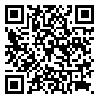Volume 24, Issue 1 (5-2018)
Back to this Issue |
Back to browse issues page
Download citation:
BibTeX | RIS | EndNote | Medlars | ProCite | Reference Manager | RefWorks
Send citation to:



BibTeX | RIS | EndNote | Medlars | ProCite | Reference Manager | RefWorks
Send citation to:
Noroozi A, Afrazeh E, Tahmasebi R. Effect of gain- and loss-framed messages on knowledge, self-efficacy and self-management in diabetic patients: A randomized clinical trial
. Journal of Hayat 2018; 24 (1) :20-34
URL: http://hayat.tums.ac.ir/article-1-2003-en.html
URL: http://hayat.tums.ac.ir/article-1-2003-en.html
1- Dept. of Health Education, School of Health, Bushehr University of Medical Sciences, Bushehr, Iran; The Persian Gulf Marine Biotechnology Research Center, Bushehr University of Medical Sciences, Bushehr, Iran
2- Dept. of Health Education, School of Health, Bushehr University of Medical Sciences, Bushehr, Iran
3- Dept. of Biostatistics, School of Health, Bushehr University of Medical Sciences, Bushehr, Iran; The Persian Gulf Marine Biotechnology Research Center, Bushehr University of Medical Sciences, Bushehr, Iran ,rahimtahmasebi@yahoo.com
2- Dept. of Health Education, School of Health, Bushehr University of Medical Sciences, Bushehr, Iran
3- Dept. of Biostatistics, School of Health, Bushehr University of Medical Sciences, Bushehr, Iran; The Persian Gulf Marine Biotechnology Research Center, Bushehr University of Medical Sciences, Bushehr, Iran ,
Abstract: (4869 Views)
Background & Aim: Diabetes is the most common metabolic disease that needs self-management. The aim of this study was to compare the effects of loss- and gain-framed messages on knowledge, self-efficacy and self-management in diabetic patients.
Methods & Materials: In this randomized clinical trial (IRCT2016122931653N1), 112 patients with type 2 diabetes referred to the 17th Shahrivar Diabetes clinic in Borazjan in 2017, were divided into three groups including loss-framed message, gain-framed message, and control. The data were collected by questionnaires in three steps; before, one week and three months after intervention. Chi-square test, one way analysis of variance and repeated measures analysis of variance were used to analyze the data on the SPSS software version 22.
Results: Before the intervention, mean scores for knowledge, self-efficacy and self-management in loss-framed messages group and gain-framed messages group were lower than control. One week and three months after the intervention, mean scores for knowledge, self-efficacy and self-management in both the loss-framed messages and gain-framed messages groups showed a significant increase compared to the control group (P<0.001). One week after the education, self-management score in the gain-framed messages group was 102.26±11.20, in the loss-framed messages group was 111.53±13.73 and in the control was 88.75±11.41. Three months after the education, self-management score in the mentioned groups were 105.58±11.80, 108.72±15.39 and 88.49±13.51, respectively.
Conclusion: The results of this study showed that designing and implementing educational programs based on loss-framed messages and especially gain-framed messages can improve knowledge, self-efficacy and self-management behavior in diabetic patients.
Methods & Materials: In this randomized clinical trial (IRCT2016122931653N1), 112 patients with type 2 diabetes referred to the 17th Shahrivar Diabetes clinic in Borazjan in 2017, were divided into three groups including loss-framed message, gain-framed message, and control. The data were collected by questionnaires in three steps; before, one week and three months after intervention. Chi-square test, one way analysis of variance and repeated measures analysis of variance were used to analyze the data on the SPSS software version 22.
Results: Before the intervention, mean scores for knowledge, self-efficacy and self-management in loss-framed messages group and gain-framed messages group were lower than control. One week and three months after the intervention, mean scores for knowledge, self-efficacy and self-management in both the loss-framed messages and gain-framed messages groups showed a significant increase compared to the control group (P<0.001). One week after the education, self-management score in the gain-framed messages group was 102.26±11.20, in the loss-framed messages group was 111.53±13.73 and in the control was 88.75±11.41. Three months after the education, self-management score in the mentioned groups were 105.58±11.80, 108.72±15.39 and 88.49±13.51, respectively.
Conclusion: The results of this study showed that designing and implementing educational programs based on loss-framed messages and especially gain-framed messages can improve knowledge, self-efficacy and self-management behavior in diabetic patients.
Keywords: diabetes self-management, gain-framed message, loss-framed message, knowledge, self-efficacy
Send email to the article author
| Rights and permissions | |
 |
This work is licensed under a Creative Commons Attribution-NonCommercial 4.0 International License. |






